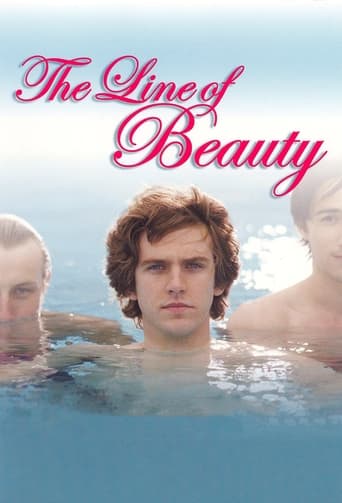2hotFeature
one of my absolute favorites!
BroadcastChic
Excellent, a Must See
Tyreece Hulme
One of the best movies of the year! Incredible from the beginning to the end.
hddu10
As someone who grew up in Europe during the 1980s, "the Line of Beauty" just seems like a self-indulgent memoir, written by someone who happened to have industry connections to make it into a production. Yes, we all remember it wasn't "cool" or "in" to be gay back then, and we all remember AIDS was scaring everyone witless. But take away the job/industry back-story and you're just left with some social-climbing, name-dropping nobody trying to interest us in who he knew way back when. This simply wasn't compelling, interesting or unique.
alandun
This is clearly an "omage" to Brideshead Revisited . . . which is also clearly the reason such ludicrous pap won the Booker Prize - always won by either "black" authors or pooftas so we all know that the English are really understanding people and better than all the others etc in the world . . . what is everyone talking about Gatsby for? It has nothing whatever to do with Gatsby? In any way whatever? . . . ??? Like everything you ever see these days this production is really beautifully done, but what for? . . .This is beautiful crap from beginning to end. I can't believe the cliché after cliché, the weak unbelievable nonsense that we are meant to weep over? We are meant to weep over a man discovering that his adoptive father has a mistress when we have seen his boyfriend, who he thinks is the most beautiful man he has ever seen (!), f*** another man in front of him? Seriously we are meant to weep - they have that "dead baby" music playing . . . blah blah it's endless I'm getting angry now!Crap as an "omage" . . . well maybe THAT is significant? With Post-Modernism you never know?
PippinInOz
The above quote is from 'The Line of Beauty' - spoken by a character to Nick Guest. As his name suggests, Nick 'thinks' he is a guest of the upper class Feddons, when the line of dialogue 'They've really taken you in haven't they?' is spoken about half way through the series, you probably find yourself mumbling to yourself, as I did: 'Haven't they just....'Nick is not a guest in the Feddon household. Nick is a Guest. The 'Feddons' are wonderfully named in this tale of 1980s Class and Thatcherism, the allusion to them being the class who 'feed on' was not lost on me. (As in they 'fed on'.......)And they feed off Nick even while he thinks he has fallen into a heavenly place - all polite but raffish upper class shenanigans, art works, the country pile. Nick is smitten by the 'lines of beauty' that meet his eye everywhere he looks. All of the contributions on this site have been excellent to read - thank you! I am particularly interested in the links to 'The Great Gatsby' and 'Brideshead Revisited' - the film that kept coming back to me though was 'The Talented Mr. Ripley' - the same awe struck young man, the same love of 'beauty', the same comments on class and money. The scenes between Nick and the 'perfect servant' (the old retainer!) who keeps her mouth shut and runs the house are priceless. Nick, in these scenes, reminds me of the position of the 19th Century Governess in households. A bit too 'upper' to be included with the rest of the servants (who did not include her) but still a paid member of staff, not family. Considering that Nick begins his tenure in the house 'to keep an eye on Cat' this analogy is not entirely far from the mark. The housekeeper's refusal to be 'matey' with him says it all. At the end when she tells him that right from the start she thought he was 'no good' did you feel hurt for Nick? Well, I did. Despite so many traits that really really made me want to dislike him A LOT! Those traits being: his ability to switch off any critique about ANYTHING as long as he was okay and could swan along with his posh family.Nick was the Governess to Cat. Nick was also the 'resident gay man' who schmoozes the Feddon's guests with his charm, including Margaret Thatcher. Tim McInnerny is brilliant as the Tory Gerald Feddon, who, unaccountably, is part of a specific group of Conservative men who loved her 'Strict Nanny' persona. Shudder! LIke Nick Guest, Margaret Thatcher was the child of a small business owner. So it makes artistic sense that they dance together at the Feddon's party in her honour.John Lydon made some astute comments when he heard about Elton John being conferred a knighthood, he more or less said that the Upper class always liked a Court Jester to entertain them, a Fool. Nick Guest, in so many ways, is The Court Jester, or Fool. The extent to which Nick is seen as a servant is in those cataclysmic moments at the end of the third episode. When Gerald Fedden blusters about Nick's 'background' ('as if we would choose you!') Nick has to acknowledge what the viewer has known for some time. Like a servant who has been caught out shagging the Lord's son, he is sent packing 'in disgrace'. Any young person who was born after about 1985 should see this television series to fully understand to what extent the AIDS virus decimated people, particularly gay men. 'The Line of Beauty' reveals the fear and paranoia surrounding this period very well. The photograph of Leo ravaged by the disease and the shell of his Lebanese / English lover as he walks into the restaurant (all eyes watching, the word 'AIDS' is the elephant in the room) is heartbreaking.But in the end......my memory of this wonderful piece of television is the tale of a young man who does not even look at the World outside of his gilded cage. (Miners' strike, CND etc).....and in the end, my sympathy for the characters is permeated by my anger at people who always think they can look the other way while the world falls apart. There lies this programmes genius. For me at least.
paul2001sw-1
Alan Hollinghurst's 'The Line of Beauty' is, at least in this adaptation, a version of 'The Great Gatsby' fitted to 1980s Britain, the story of a young man from an ordinary background who mistakenly harbours too many illusions about the beautiful people of the smart set. The story lacks the utter poignancy of Fitzgerald's book because the hero (who, co-incidentally or not, shares the name of Nick with the other novel's protagonist) only rejects his adopted world when it rejects him; But the screenplay, cinematography, and performances are all first rate, especially that of Tim McInerny, playing a MP whose ultimate ruthlessness, self-righteousness, and rottenness, is hidden beneath a layer of almost genuine charm and kindness. The political overtones of the story are somewhat lost in a treatment that dwells almost exclusively inside the gilded balloon, and all of the characters could be handled less sympathetically with some justification, but the indulgent early mood reaps final reward when things go sour. Screenwriter Andrew Davies made his name with the contemporary series 'A Very Peculiar Practice', but these days seems to concentrate largely on period drama. This aberration proves itself welcome, and leaves one hopeful of more to come.

